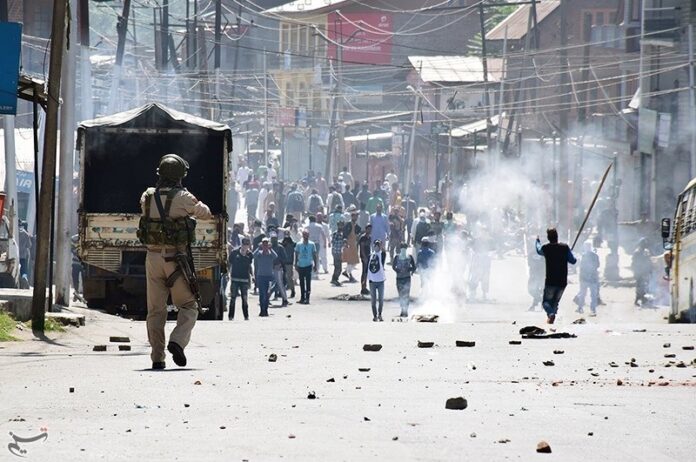Dr Syed Nazir Gilani – President Jammu and Kashmir Council for Human Rights (JKCHR) – has written to United Nations High Commissioner for Human Right Michelle Bachelet to express his concerns over the Indian troops’ beef-up in Indian-administered Kashmir (IAK). While bringing her attention to the ‘grave situation’ in IOK, Dr Gilani writes that ‘a cloud of fear and unease has shrouded the habitat and people of IAK’ after a spike in the deployment of Indian forces in the region.
Dr Gilani’s email to the UN commissioner can be found below:
Excellency Mme Michelle Bachelet
United Nations High Commissioner for Human Rights
Office of the United Nations High Commissioner for Human Rights (OHCHR) Palais des Nations CH-1211 Geneva 10, Switzerland
Mme High Commissioner
Deployment of Additional Central Armed Police Forces (CAPFs) in J&K (Indian Administered)
I wish to bring it to your urgent attention that a “Grave Situation” has developed in the Indian Administered Jammu and Kashmir.
In utter disregard of two OHCHR Reports on the situation in the Indian Administered part of Jammu and Kashmir, recommending respect for the right of self-determination, mediation offer made by President Donald Trump on 22 July 2019 and statement made by China on 26 July 2019 that it would support the efforts of the international community, including the efforts of US, in finding a peaceful solution of Kashmir dispute, Government of India (Ministry of Home Affairs) has ordered despatch of additional 100 companies of Central Armed Forces (CAFs) for Kashmir Valley.
These include CRPF 50 companies, BSF 10 companies, SSB 30 companies and ITBP 10 companies. The various districts targeted to receive these dreaded forces are Srinagar (15 companies), Budgam (5 companies), Ganderbal (5 companies), Anantnag (5 companies), Kulgam (5 companies), Pulwama (10 companies), Shopian (5 companies), PD Awantipora (5 companies), Baramulla ((5 companies), Sopore (10 companies), Bandipora (5 companies) and Handwara (5 companies).
A cloud of fear and unease has shrouded the habitat and people. The move is looked upon with great suspicion and seems sinister because the forces include Sashastra Seema Bal (SSB) and Indo Tibetan Border Police (ITBP). These two forces would be bringing along a killing instinct and communal hatred against Muslims in the valley.
Earlier on February 24 2019, 100 companies of central paramilitary forces were airlifted and deployed in the valley. The increase has happened post-UN 14 June 2018 report, which has highlighted the highly militarised character of the Kashmir valley.
These are special circumstances and OHCHR has an urgent role to play to ensure the rights of the people specially identified in the UN Security Council Resolution of 21 April 1948. This military build-up is a serious violation of the seven restraints placed on the Indian security forces. Three of these restraints have been placed by the UN Security Council Resolution of 21 April 1948 on their number, behavior and location.
OHCHR could very kindly consider the calling of a Special Session of Human Rights Council and also look into taking up the matter with the UN GA and UN SC. In the interim an urgent communication needs to be sent to Government of India and UNMOGIP may also be alerted in this regard.
Excellency I shall be copying the Foreign Office of Pakistan and some NGOs who subscribe a continued interest in the “rights and dignity” and “security and self-determination” of the people of Kashmir into this communication.
Yours Sincerely
Dr Syed Nazir Gilani
President-JKCHR




